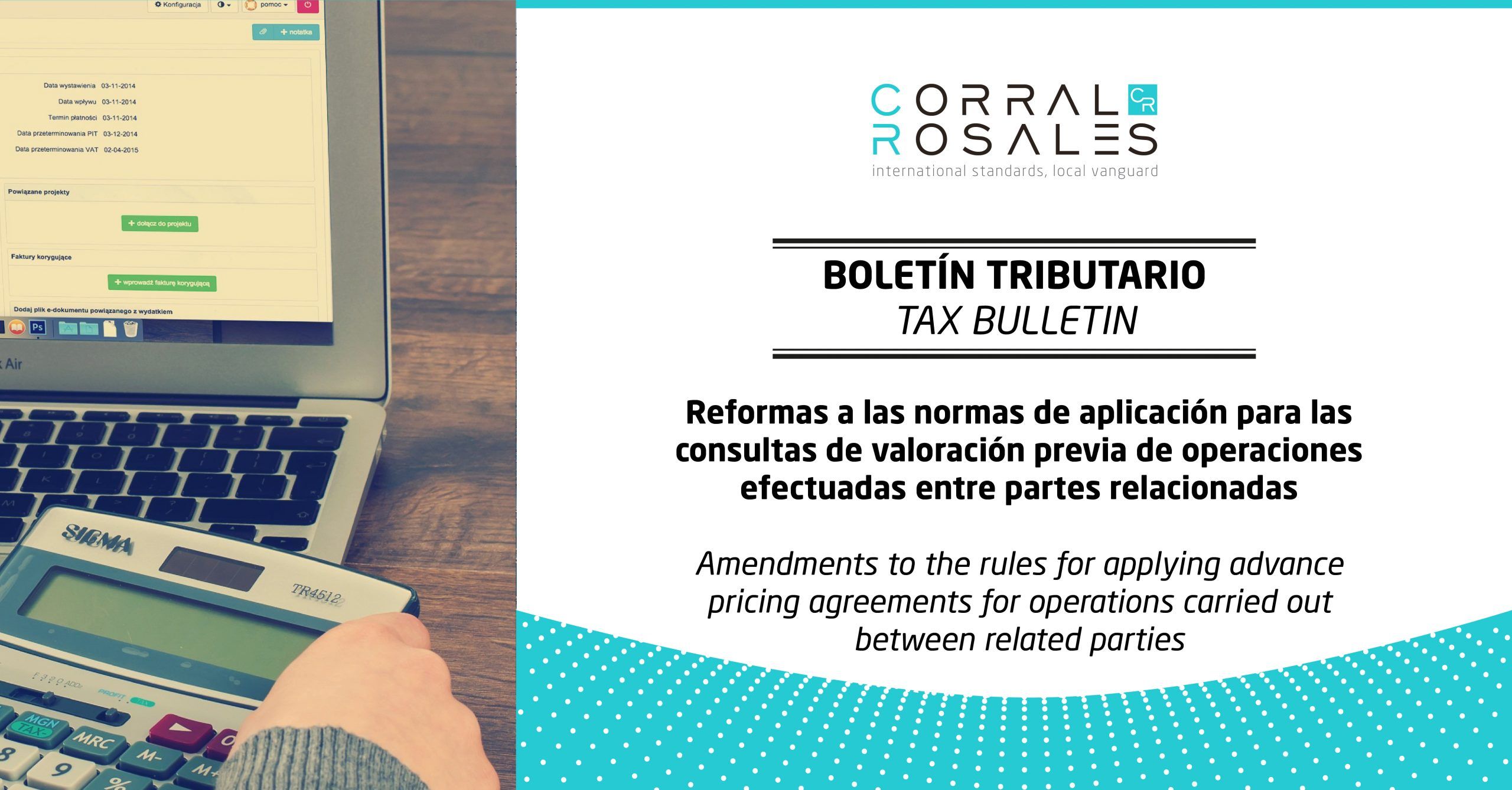Do you want to receive our newsletters with information like the one you just read?
Click here and subscribe.
Suspension of deadlines in tax matters


Do you want to receive our newsletters with information like the one you just read?
Click here and subscribe.

Do you want to receive our newsletters with information like the one you just read?
Click here and subscribe.

On those cases, that living wage compensation is applicable, employer shall pay it to employees no later than March 31st, 2021.
For living wage payment, “profit” shall be understood as the value declared by the employer as accounting profit deducting: (i) employees profit sharing, (ii) tax or advance payment fixed for the fiscal year declared, and (iii) statutory reserve.
Do you want to receive our newsletters with information like the one you just read?
Click here and subscribe.

The following is a summary of the changes introduced in each Regulation:
Regulation NAC-DGERCGC14-00001048
Information to be included of the parties and the transactions subject to consultation:
a. Names and surnames, company name, tax identification number, country of tax residence and income tax rate of the taxpayer and the parties with whom the operations covered by the consultation are carried out,
b. Detailed description of the operations, including among other elements, their nature, characteristics, amount in US dollars of the last three fiscal years, and the effect on the taxpayer’s income,
c. If the transaction is a service, documentation must be submitted to identify its invoicing, periodicity, and form of payment. In the case of royalties, in addition to the above, the intangible asset, its owner, administrator (if applicable), the method of valuation of the intangible asset and its calculation must be fully identified,
d. Comparability analysis according to the terms described in the tax legislation, including the following elements: i) characteristics of the operations; ii) analysis of the functions or activities performed, including the assets used and risks assumed; iii) contractual terms; iv) economic or market circumstances, and v) business strategies, both of the taxpayer and its related parties involved in the operations subject to consultation,
e. Details of the search performed in the respective databases to obtain the comparable to be used. The date on which the search was performed attaching the screenshots of the filters applied in the databases, the selection and discarding matrix of the comparable. The reasons for the selecting the proposed method, in the terms contemplated for the Integral Transfer Pricing Report,
f. Copies of existing contracts, agreements or arrangements entered into by the taxpayer with related or unrelated parties, which affect, directly or indirectly, the operations covered by the valuation consultation. If applicable, copies of the cost sharing agreements, including the cost sharing criteria,
g. Audited balance sheet and income statement of the taxpayer for the last tax year as of the date of filing the consultation, including the notes to the financial statements. If the taxpayer is not required to have audited financial statements, the balance sheet, income statement and accounting books at the highest level of detail,
h. Audited balance sheet and income statement of the taxpayer’s related parties subject to the analysis, including the notes to the financial statements. If the taxpayer’s related parties are not required to have audited financial statements, the balance sheet, income statement and accounting books at the highest level of detail,
i. Balance sheet and income statement of the companies proposed as comparable for the last fiscal year. This requirement is not applicable if the taxpayer proposes the Comparable Uncontrolled Price (CUP) Method, and
j. Any other relevant information, data, or documentation that the applicant considers necessary to support the methodological proposal for valuation of related party transactions.
Application report:
In the application report the taxpayer must include the following information:
a. The working papers in Excel including: the indicator (or price) of the taxpayer, the indicators (or prices) of the comparable, comparability adjustments, interquartile range, among others, depending on the methodology.
b. Description and reasoning of any particular fact or circumstance of the fiscal year analyzed that affected the valuation of the prices or financial margins of the analyzed party.
c. The taxpayer may not file a new report when the tax authority has initiated an assessment procedure.
Regulation NAC-DGERCGC15-00000571
Deadline for submitting the request:
The request may be filed until the last working day of February of the tax period in which the application of a higher limit of deductibility is intended. For fiscal year 2021, the request may be filed until the last business day of March.
Report of transfer pricing adjustments:
In the event that, upon application of the methodology approved, there is a transfer pricing adjustment, the taxpayer must report such on the income tax form.
Substitute tax returns:
If the increase of the deductibility limit is approved, the taxpayer is able to file substitute tax returns regarding the years which income tax returns was filed prior to the notification of the response to the request. The substitute tax return must be filed within 60 days after the notification of the response.
Do you want to receive our newsletters with information like the one you just read?
Click here and subscribe.

Labor Ministry through Ministerial Agreement MDT-2021-042, reformed the “General Guidelines for Internships”.
The Agreement establishes that students under a dual training modality may be considered for the mandatory percentage of interns.
Students under dual training are those whose professional training process occurs in educational environments and production or real services environments.
According to the Internship Law, for every 100 regular employees, employers are ordered to hire interns in a number equal to 4% of their employees who hold a professional degree. Consequently, the obligation to hire interns is subject to 2 conditions: (i) company has 100 or more employees; and (ii) at least 4% of such employees hold a professional degree.
Do you want to receive our newsletters with information like the one you just read?
Click here and subscribe.

Regulation NAC-DGERCGC21-00000009 issued on February 4, 2021 and published in the third supplement to the Official Registry 386 of February 5, 2021, the General Director of the Internal Revenue Service established that the personal expenses annex of the fiscal year 2020 may be filed, for this time, until the following dates:

Do you want to receive our newsletters with information like the one you just read?
Click here and subscribe.

The Labor Ministry by Ministerial Agreement MDT-2020-286 regulated the special labor agreement for private Higher Education Institutions academic staff:
– Scope: Mandatory implementation to hire academic staff on private Higher Education Institutions.
– Term for Regular Staff: Up to 1 year (continuous or discontinuously) renewable up to 2 years. A 90-day trial period may be agreed.
– Term for Non-Regular Staff: Up to 1 year (continuous or discontinuously). The agreement may be renewed as many times as necessary. A 90-day trial period may be agreed.
– Weekly working day: Up to 40 hours per week, that may be distributed in no more than 6 days a week. A noninterrupted rest of 24 hours per week is guaranteed.
– Special leave regime: The Higher Education Institutions may grant, at the employee´s request, a special leave with or without payment.
If the leave is without payment, the employee is not entitled to labor and social benefits. The employment relationship is suspended; therefore, no seniority will be generated during it.
– Termination of the agreement: The employment relationship ends once the term has concluded, without any other formality.
– Termination for cause: Under Labor Code provisions to terminate an employment relationship with cause, prior Labor Ministry authorization (“Visto Bueno”), the following definitions shall be included:
– SUT´s registration: Within a period of 15 days upon its execution.
Do you want to receive our newsletters with information like the one you just read?
Click here and subscribe.

Executive Decree 1240 issued on February 3, 2021 by the President of the Republic amended the Internal Tax Regime Regulations regarding the Tax Regime for Small Businesses.
It establishes that, in order to calculate the income tax, taxpayers subject to such regime must apply a 2% rate over the net sales derived from the business activity subject to this regime and subtract: (i) the income tax withholdings made in the same period with respect to the activities subject to the regime; and, (ii) the income tax credit.
It is also stated that taxpayers subject to the regime, that in the fiscal year 2020 did not obtain any profit (calculated before paying the income tax) from the economic activities subject to the regime, may:
1. Pay the applicable income tax for the fiscal year 2020 until November 2021; and,
2. Pay the applicable income tax for the fiscal year 2021 until March 2022.
Those taxpayers who have paid the tax with interest and penalties will not be entitled to request a reimbursement.
Do you want to receive our newsletters with information like the one you just read?
Click here and subscribe.

Prior to the enactment of the Law of Modernization of the Companies Law, on December 10, 2020, limited liability companies and corporations were required to submit to the Superintendence of Companies, in the month of January of each year, the list of foreign shareholders.
The aforementioned Modernization Law established that this information had to be filed before the Internal Revenue Service, in accordance with the terms and conditions established for such purpose.
However, Regulation NAC-DGERCGC21-00000005 issued by the Internal Revenue Service establishes that, for this one time only, companies must file this information through the web portal of the Superintendence of Companies (www.supercias.gob.ec) until January 31, 2021.
Compliance with this obligation does not exempt taxpayers from filing the Shareholders’ Annex (APS).
Do you want to receive our newsletters with information like the one you just read?
Click here and subscribe.


(ii) Determines that the rate applicable to the analysis of economic concentration operations notified for information purposes (not mandatory filing) is half the base fee, regardless of the value of the total revenue.
(iii) Allows payment via wire transfer.
Do you want to receive our newsletters with information like the one you just read?
Click here and subscribe.